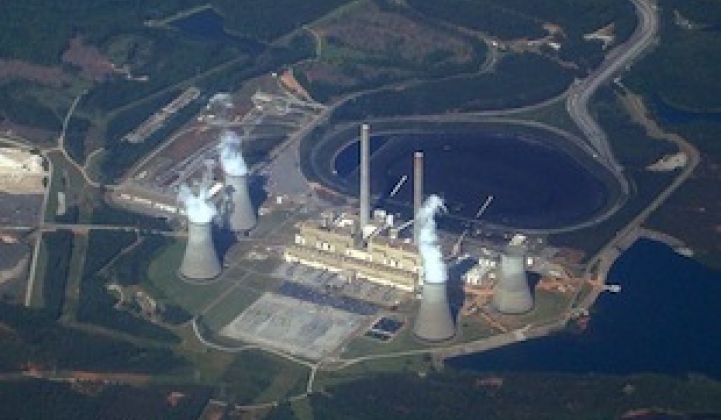Want to help write legislation that would -- in the unlikely event it were to pass -- promote renewable energy development and reduce greenhouse gas emissions, while probably putting a dent in the federal deficit, too? Well, step right up. Four Congressional Democrats have put forth a draft bill to price carbon, and they want you to help them fill in some key blanks.
Reps. Henry Waxman (Calif.) and Earl Blumenauer (Ore.) joined with Sens. Sheldon Whitehouse (R.I.) and Brian Schatz (Hawaii) on Tuesday to release what they’re calling a “discussion draft” of a bill (PDF) that emphasizes simplicity: big polluters pay, by the ton, for the carbon they emit. The money raised is then returned to the people in a variety of possible ways.
Pricing carbon makes such obvious sense that from Robert Reich on the left to Gregory Mankiw on the right, economists overwhelmingly agree that a carbon tax that helps reflect the true costs of fossil-fuel use would be the most efficient way to spur clean-energy development.
Proposals have come down the legislative pike before and gone nowhere, and only a blazing optimist would bet this new effort will result in fees on carbon emissions being enshrined in the U.S. Code of Laws. Nevertheless, by releasing it in draft form and soliciting input, this bid could at least spark a badly needed conversation. Plus, there are some hopeful signs to be found.
First, this proposal comes on the heels of the Barbara Boxer-Bernie Sanders proposal in the Senate, suggesting that Democrats, at least, are ready to push on this issue.
Second, despite continued bleating from the anti-science crowd, there does seem to be heightened awareness of climate change these days. President Obama has been talking about it more, that’s for sure.
Third, based on what’s happening in Europe, cap-and-trade, often offered as a more politically palatable substitute to a carbon tax, has lost credibility by failing to incentivize reduced emissions.
Fourth, as Richard Caperton pointed out on the Climate Progress blog, “Unless this bill or something very similar gets passed, Congress can look forward to the Environmental Protection Agency using its authority under the Clean Air Act to put limits on greenhouse gas pollution from the largest polluters.”
And fifth, Washington is in the grip of deficit hysteria. Could a carbon tax help bring a breakthrough there? Slate’s Matthew Yglesias said it makes sense, even if it won’t happen: “Far and away the best way for Republicans to put a proposal on the table that doesn’t increase marginal tax rates on the rich but does have some appeal to some Democrats would be to propose a carbon tax instead and force the White House to choose between its commitment to soaking the rich and its commitment to environmental causes.”
Blumenauer, a Portland liberal, included the deficit-cutting possibility in his canned statement, saying:
"This proposal has a great deal of potential to help protect the environment, reduce the deficit, create jobs, and support the transition to clean energy sources and low carbon transportation options. I look forward to working with my colleagues and seeking feedback on how best to use the revenue and ensure that the program is administered in a fair and equitable manner."
About that feedback -- the carbon quartet seeks answers to four questions, including that big one about how to return the tax money to the people:
- What is the appropriate price per ton for polluters to pay? The draft contains alternative prices of $15, $25, and $35 per ton for discussion purposes.
- How much should the price per ton increase on an annual basis? The draft contains a range of increases from 2 percent to 8 percent per year for discussion purposes.
- What are the best ways to return the revenue to the American people? The discussion draft proposes putting the revenue toward the following goals, and solicits comments on how to best accomplish each: (1) mitigating energy costs for consumers, especially low-income consumers; (2) reducing the federal deficit; (3) protecting jobs of workers at trade-vulnerable, energy-intensive industries; (4) reducing the tax liability for individuals and businesses; and (5) investing in other activities to reduce carbon pollution and its effects.
- How should the carbon fee program interact with state programs that address carbon pollution?
Got a thought? Send it on to [email protected].
***
Editor's note: This article is reposted in its original form from EarthTechling. Author credit goes to Pete Danko.



